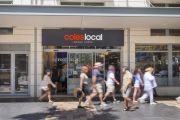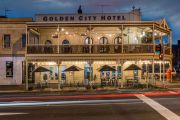Land speculators losing big
Luke Housego
Financial Review Young Rich Lister Andrew Welsh is predicting more speculators will forfeit their deposits as settlement deadlines approach and land prices continue to soften.
“Speculative land buyers had been contracting to buy residential lots, as well as potential greenfield development sites, but were caught out as demand dropped away and the market started its retreat,” said Mr Welsh, a former Essendon AFL player and now a rising developer.
“With the slowdown in the market over the last six months and speculators unable to get a desired price at market to on-sell, I have had people coming to me with development sites daily.”
Those taking a bet on greenfield or broad acre development sites were entering a market where property values start in the millions of dollars and quickly rise.
To secure these large sites, groups would often form a syndicate, then approach potential vendors – typically former farmers – and make an offer, often at excessive prices and on unrealistic terms. This created excessive expectations among vendors, Mr Walsh observed, resulting in reliable offers from developers aiming to secure a site for fair value being excluded.
“I think over the next 12 to 18 months in the broad acre space there will be a number of properties bought by syndicated speculators that won’t have the money at settlement and the vendors will be putting their properties back on the market for a far less price than they had agreed to with speculators.”
The problem has been most evident in the growth corridors of Melbourne where Mr Welsh, through the expanding Welsh Group and its home design, construction, and property development businesses, has a growing presence.
Earlier this year, developers including Khurram Saeed of Resi Ventures and Financial Review Rich Lister Nigel Satterley of Satterley Property Group also raised the issue, voicing concerns about “gamblers” who would take a bet on buying land for a given price, pay the deposit, then on-sell prior to settlement, aiming to take the increase in price since signing the contract as profit.
These concerns were raised in the middle of the year, following astronomical price rises in the residential land market. A HIA-CoreLogic Residential Land Report released at the time had shown the average cost of residential land in Melbourne’s outer suburbs had climbed 41 per cent in the year to March.
When speculators on-sold land they had secured, they were doing so prior to settlement. This meant they never took ownership of the land. Instead, after contracting to buy the land, a speculator would market the property at an increased price. If a secondary buyer accepted that price, they would be “nominated” to take over the speculator’s obligations under the land sale contract.
The secondary buyer would then pay the speculator the difference between the higher price they agreed on nomination and the price agreed under the original sale contract, as well as any amounts already paid by the speculator to the vendor before the nomination.
Over the coming months, the pipeline of speculators who have locked in themselves into land purchases face a decision of falling foul of their contractual obligations and forfeiting their deposits, or taking a hit by on-selling on the market for a lower price.











